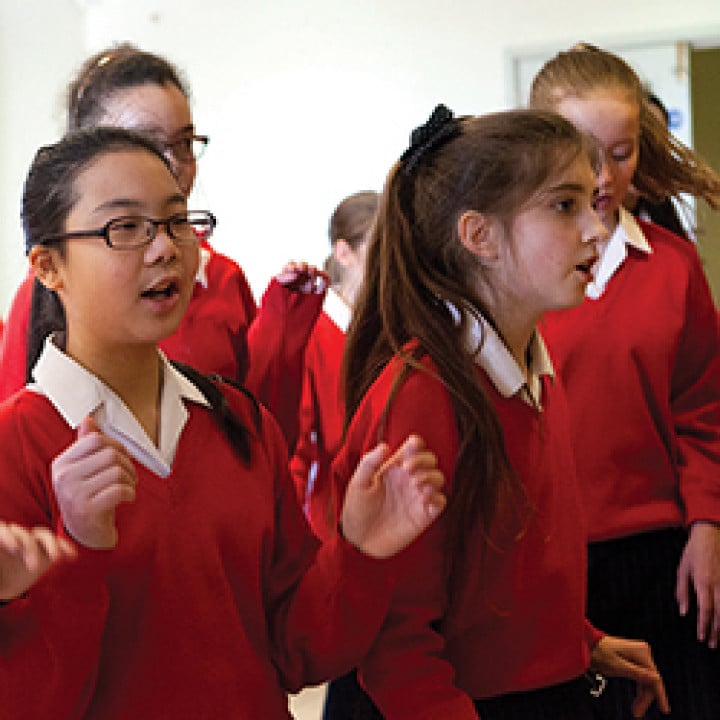
What role do community choirs play in contemporary Britain?
I am beginning to think that such community choirs have a massive role to play in providing people with a sense of social cohesion. I think there are many factors today which cause people to think of themselves as individuals with no responsibilities towards anyone around them. To take just one example, the mobile phone with headphones means that people on streets, on trains and buses are self-contained units, listening to music or whatever entirely alone. They might just as well have a big sign around their necks saying ‘Do not disturb’. It’s so obvious that the act of singing together in large groups combats this personal isolationism and I cannot imagine anyone would disagree that should be applauded and encouraged. The collective spirit within such large-scale music has an impact on our fragmenting world, when all the talk is about the dividing of nations, peoples and ethnicities. Anything that can bring people together in a common purpose like this has to be good.
What are the key elements you need to form a choir and to keep one going?
Choirs can be quite democratic units, I think, especially in their organisation but they often also live or fail through the efforts of one or two key people, especially the conductor/director. This person has to have the vision, the drive and the musical knowhow to make the whole enterprise work, often in the face of bewilderment, ridicule and open hostility. One person the Radio 4 programme [Choral History of Britain] didn’t mention, for example, was Gareth Malone and I feel he has single-handedly transformed the amateur, non-auditioned choral picture in this country and had to put up with a lot of stick thereby. You cannot doubt his energy, enthusiasm and drive.
What, in your experience, are the mental and physical benefits of singing in a choir?
It has been a long time since I sang in a choir but those odd moments in the last couple of decades when I have been part of something large-scale like this always strike me as golden. There are many factors at work; allowing myself to become part of a larger whole, abdicating a certain amount of musical control to the conductor, sharing responsibility for my vocal line with people around me, some of these things might strike one as indicating a loss of self that may not be useful. But I think there are moments when this loss of self is especially useful on a mental and spiritual level.
Why should people sing in choirs?
As I’ve suggested above, I think it is useful on a social scale, in terms of general health and, more than anything, because it is fun. I don’t just support the idea of people singing in choirs; I love it when people sing together en masse anywhere. Whether it be at sporting matches, on the back of coaches, singing ‘happy birthday’ around a restaurant table, singing back to their pop idols in rock concerts, or on occasions when it just happens spontaneously at public gatherings, I revel in it. To join an organised choir of any sort is simply an excuse to do such a thing more often with like-minded people.
What happens when large groups of people get together to sing?
Again, I have no researched evidence to be able to answer this question. The Radio 4 programme makers have collected a lot of material to answer this better; certainly the suggestion is that our bodies begin to coincide in some way. I’d love to believe that were true. I just think it is very powerful when large numbers of people sing the same words together. Who benefits from choirs in the wider context? I’ve heard it said that the people who gain most from singing English madrigals are the singers, perhaps not so much the audience! Perhaps audiences for the big choral classics or for rock choirs might wonder whether the people on stage are getting more out of the experience than they are. But the audience is an essential part of performing; without them you are in rehearsal only. I love rehearsals, mind you; it’s a tremendous vibe. But a performance is an altogether different pressure. If you expand the question to look at choral singing in terms of the health and well-being of a population, I think you could find evidence that communal singing is beneficial for the mental physical health of a nation but, as I’ve said, I don’t have that data.
What does the future look like for choirs?
Are enough young people getting involved? This is another question that is beyond my experience to answer. I can observe anecdotally that some church and cathedral choirs are finding it difficult to recruit choristers but I have no real evidence to say whether this is a national problem or whether my perception is in fact true. The choirs with whom this programme brought me into contact seemed to be flourishing and with plenty of younger members. So I remain upbeat about the future of choral singing. I think it will adapt and evolve with society but I am confident that the bedrock of the British classical choral tradition will be upheld for years to come.
Find out more about Roderick Williams here.



